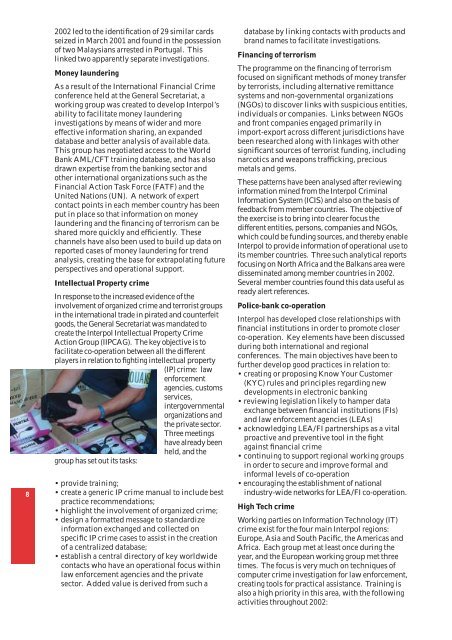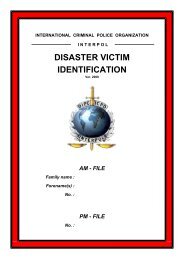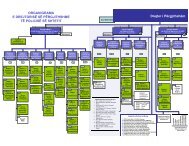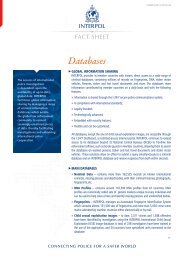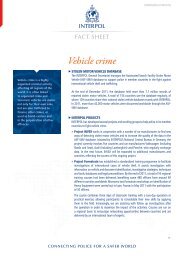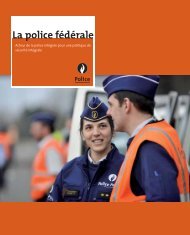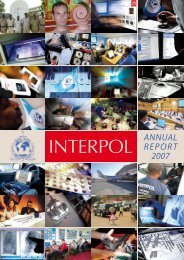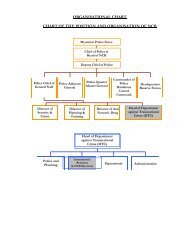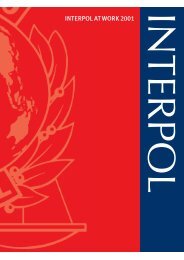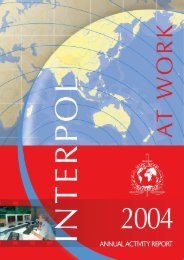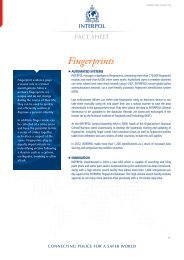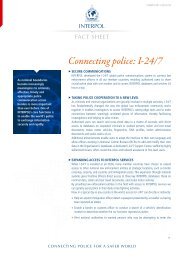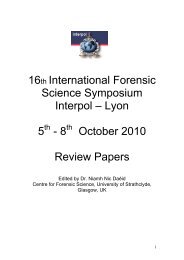Download - Interpol
Download - Interpol
Download - Interpol
Create successful ePaper yourself
Turn your PDF publications into a flip-book with our unique Google optimized e-Paper software.
8<br />
2002 led to the identification of 29 similar cards<br />
seized in March 2001 and found in the possession<br />
of two Malaysians arrested in Portugal. This<br />
linked two apparently separate investigations.<br />
Money laundering<br />
As a result of the International Financial Crime<br />
conference held at the General Secretariat, a<br />
working group was created to develop <strong>Interpol</strong>’s<br />
ability to facilitate money laundering<br />
investigations by means of wider and more<br />
effective information sharing, an expanded<br />
database and better analysis of available data.<br />
This group has negotiated access to the World<br />
Bank AML/CFT training database, and has also<br />
drawn expertise from the banking sector and<br />
other international organizations such as the<br />
Financial Action Task Force (FATF) and the<br />
United Nations (UN). A network of expert<br />
contact points in each member country has been<br />
put in place so that information on money<br />
laundering and the financing of terrorism can be<br />
shared more quickly and efficiently. These<br />
channels have also been used to build up data on<br />
reported cases of money laundering for trend<br />
analysis, creating the base for extrapolating future<br />
perspectives and operational support.<br />
Intellectual Property crime<br />
In response to the increased evidence of the<br />
involvement of organized crime and terrorist groups<br />
in the international trade in pirated and counterfeit<br />
goods, the General Secretariat was mandated to<br />
create the <strong>Interpol</strong> Intellectual Property Crime<br />
Action Group (IIPCAG). The key objective is to<br />
facilitate co-operation between all the different<br />
players in relation to fighting intellectual property<br />
(IP) crime: law<br />
enforcement<br />
agencies, customs<br />
services,<br />
intergovernmental<br />
organizations and<br />
the private sector.<br />
Three meetings<br />
have already been<br />
held, and the<br />
group has set out its tasks:<br />
• provide training;<br />
• create a generic IP crime manual to include best<br />
practice recommendations;<br />
• highlight the involvement of organized crime;<br />
• design a formatted message to standardize<br />
information exchanged and collected on<br />
specific IP crime cases to assist in the creation<br />
of a centralized database;<br />
• establish a central directory of key worldwide<br />
contacts who have an operational focus within<br />
law enforcement agencies and the private<br />
sector. Added value is derived from such a<br />
database by linking contacts with products and<br />
brand names to facilitate investigations.<br />
Financing of terrorism<br />
The programme on the financing of terrorism<br />
focused on significant methods of money transfer<br />
by terrorists, including alternative remittance<br />
systems and non-governmental organizations<br />
(NGOs) to discover links with suspicious entities,<br />
individuals or companies. Links between NGOs<br />
and front companies engaged primarily in<br />
import-export across different jurisdictions have<br />
been researched along with linkages with other<br />
significant sources of terrorist funding, including<br />
narcotics and weapons trafficking, precious<br />
metals and gems.<br />
These patterns have been analysed after reviewing<br />
information mined from the <strong>Interpol</strong> Criminal<br />
Information System (ICIS) and also on the basis of<br />
feedback from member countries. The objective of<br />
the exercise is to bring into clearer focus the<br />
different entities, persons, companies and NGOs,<br />
which could be funding sources, and thereby enable<br />
<strong>Interpol</strong> to provide information of operational use to<br />
its member countries. Three such analytical reports<br />
focusing on North Africa and the Balkans area were<br />
disseminated among member countries in 2002.<br />
Several member countries found this data useful as<br />
ready alert references.<br />
Police-bank co-operation<br />
<strong>Interpol</strong> has developed close relationships with<br />
financial institutions in order to promote closer<br />
co-operation. Key elements have been discussed<br />
during both international and regional<br />
conferences. The main objectives have been to<br />
further develop good practices in relation to:<br />
• creating or proposing Know Your Customer<br />
(KYC) rules and principles regarding new<br />
developments in electronic banking<br />
• reviewing legislation likely to hamper data<br />
exchange between financial institutions (FIs)<br />
and law enforcement agencies (LEAs)<br />
• acknowledging LEA/FI partnerships as a vital<br />
proactive and preventive tool in the fight<br />
against financial crime<br />
• continuing to support regional working groups<br />
in order to secure and improve formal and<br />
informal levels of co-operation<br />
• encouraging the establishment of national<br />
industry-wide networks for LEA/FI co-operation.<br />
High Tech crime<br />
Working parties on Information Technology (IT)<br />
crime exist for the four main <strong>Interpol</strong> regions:<br />
Europe, Asia and South Pacific, the Americas and<br />
Africa. Each group met at least once during the<br />
year, and the European working group met three<br />
times. The focus is very much on techniques of<br />
computer crime investigation for law enforcement,<br />
creating tools for practical assistance. Training is<br />
also a high priority in this area, with the following<br />
activities throughout 2002:


